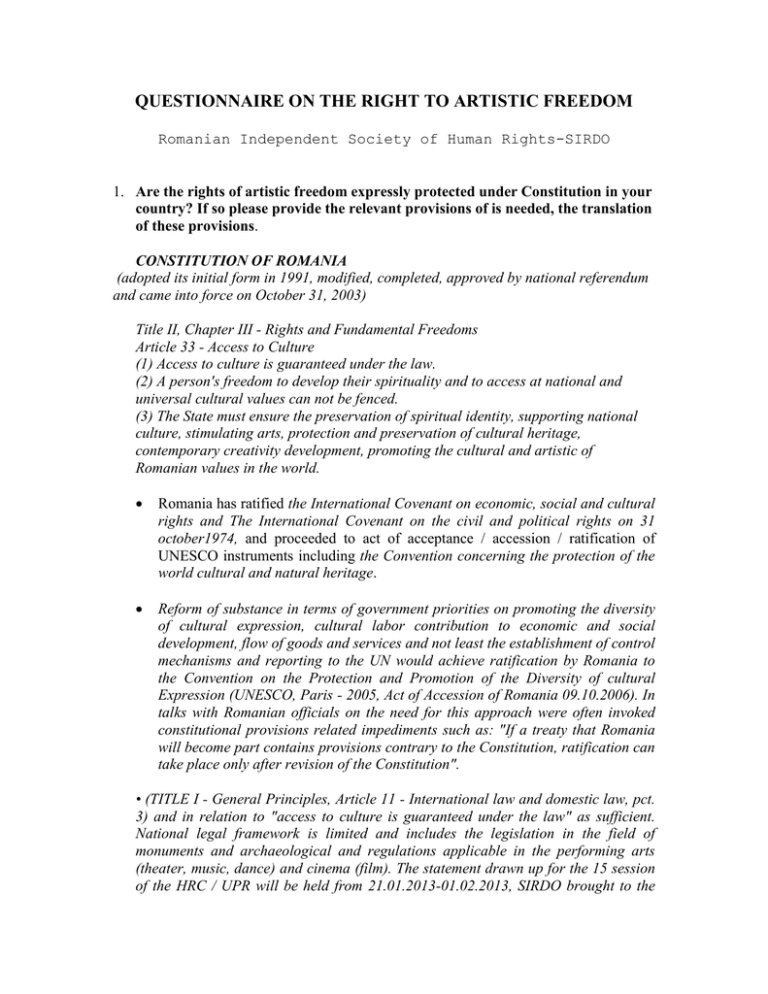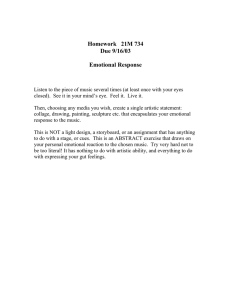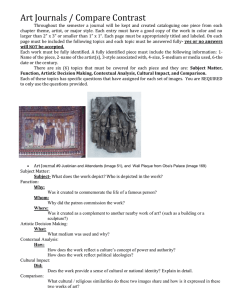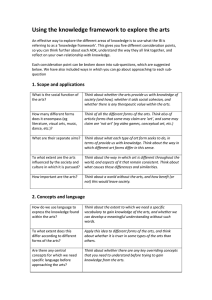QUESTIONNAIRE ON THE RIGHT TO ARTISTIC FREEDOM
advertisement

QUESTIONNAIRE ON THE RIGHT TO ARTISTIC FREEDOM Romanian Independent Society of Human Rights-SIRDO 1. Are the rights of artistic freedom expressly protected under Constitution in your country? If so please provide the relevant provisions of is needed, the translation of these provisions. CONSTITUTION OF ROMANIA (adopted its initial form in 1991, modified, completed, approved by national referendum and came into force on October 31, 2003) Title II, Chapter III - Rights and Fundamental Freedoms Article 33 - Access to Culture (1) Access to culture is guaranteed under the law. (2) A person's freedom to develop their spirituality and to access at national and universal cultural values can not be fenced. (3) The State must ensure the preservation of spiritual identity, supporting national culture, stimulating arts, protection and preservation of cultural heritage, contemporary creativity development, promoting the cultural and artistic of Romanian values in the world. Romania has ratified the International Covenant on economic, social and cultural rights and The International Covenant on the civil and political rights on 31 october1974, and proceeded to act of acceptance / accession / ratification of UNESCO instruments including the Convention concerning the protection of the world cultural and natural heritage. Reform of substance in terms of government priorities on promoting the diversity of cultural expression, cultural labor contribution to economic and social development, flow of goods and services and not least the establishment of control mechanisms and reporting to the UN would achieve ratification by Romania to the Convention on the Protection and Promotion of the Diversity of cultural Expression (UNESCO, Paris - 2005, Act of Accession of Romania 09.10.2006). In talks with Romanian officials on the need for this approach were often invoked constitutional provisions related impediments such as: "If a treaty that Romania will become part contains provisions contrary to the Constitution, ratification can take place only after revision of the Constitution". • (TITLE I - General Principles, Article 11 - International law and domestic law, pct. 3) and in relation to "access to culture is guaranteed under the law" as sufficient. National legal framework is limited and includes the legislation in the field of monuments and archaeological and regulations applicable in the performing arts (theater, music, dance) and cinema (film). The statement drawn up for the 15 session of the HRC / UPR will be held from 21.01.2013-01.02.2013, SIRDO brought to the attention CESCR conclusions on the need for cultural reform and ratification by Romania to the Convention of the protection and promotion of the diversity of cultural expression. 2. If relevant, please provide a brief summary of important decisions relating to artistic freedom adopted by judicial authorities in your country over the last ten years. • Page on contemporary creation / cultural diversity of the Ministry of Culture and National Heritage site is under construction but we can remember that in the last ten years through the efforts of public funds or private sources there were concerns about: making cultural heritage (efforts is focused mainly on conservation Orthodox places of worship and architectural values were abandoned at the mercy of real estate developers), keeping the traditional values (folklore festivals and performances), conservation of monuments (Brancusi sculptural complex from Tirgu Jiu), conservation of classical Roman literature and contemporary (library collection for all), organizing film festivals (festival DaKino), theater (Ion Luca Caragiale festival, the International Theatre Festival in Sibiu), classical music (George Enescu International Festival), modern music (jazz International Festival from Sibiu, pop music festivals Golden Stag - Brasov, Calatis, Mamaia etc.). • Ministry of Culture and National Heritage is the Government's expert body that develops and enforces policies and strategies in the fields of culture and art, religion and film, audiovisual and develops strategy, being the project management unit Culture 2007-2013. • There legislative initiatives under public debate, which is derived from the proposed Regulations and Directives of the European Union (for example: Creative Europe Programme from 2014 to 2020, Europe for Citizens Programme 2014-2020, European Capital of Culture). 3. Has your country adopted any official policy relating to art and artistic freedom? If so, please provide summary of the main elements included in such policy. Romanian Constitution guarantees freedom of expression of thoughts, opinions, any creation and declaring them as inviolable (Art. 30/1), prohibits censorship of any kind (Article 30/2) guarantees freedom of thought and religious beliefs (Article .29 / 1) provides for freedom of conscience which must be manifested in a spirit of tolerance and mutual respect (Article 29/2). 4. Is there a legal definition of “artist” in your country? If so does this definition have any bearing on the status of artist, as well as their artistic freedom? Does organization of artist agree with such definition? No national legal document does not contain a definition of the artist and this cancels the “de jure” and “de facto” status of the artist's own to determine its position and role in society. The only source of inspiration for artists legislator could be the definition of explanatory dictionary of the Romanian language, second edition 1998 ("person who works in a creative talent in a field of art, the person in the profession talent proves that exercise"). 5. Is there an official legal definition of “artisans” and craftsmen/women? If so, which consequences does this definition have on the status of artisans and craftsperson in terms of their artistic freedom? Does organization of artisans/craftswomen agree such definition? There is no legal definition of these categories and the fact that craftsmen and artisans working on their own are not helped to make full use of their work. Ministry of Labor, Family and Social Protection has proposed for public debate the draft law contains implicit rules of social economy of artisanal activity but the document does not contain a definition of the category in question. NB. "The person who works handicrafts, art craftsman working with the person skilled in a craft that has a craft practice" - Explanatory Dictionary of Romanian language. 6. In your view, what are the main impediments encountered by artist in their work in your country? Lack of legal status entails inconsistent social status and recognition of artistic value. Without a regulated formula official artwork on one side is not explicitly part of the cultural politics of the state and on the other hand do not benefit from an organized public representation of value is canceled ultimate goal of the artistic act itself, which is become a model for high quality education to shape lines, moral and aesthetic expression. As a consequence syncope occurs mostly in teams institutionalized because of "cultural infrastructure". NB: The film industry is difficult to obtain financing from the state budget for the commissioning of the project. As a result of film and theater productions sometimes become independent or semi-autonomous. Even if this causes an increase in the quality and competitiveness, side effects observed in removing the specific artistic act objectively and independently and submitting art to a single denominator "stuff" in a market economy. 7. In this regard, what measures are required to combat these impediments? After 1989, the transition from totalitarian regime to a market economy has shaken besides the political system and the economic, social and professional groups in Romania, causing 'victims of change'. These include artists and guild that has not received due attention, as bearers and creators of values. Management of cultural institutions is based on Government Emergency Ordinance nr.189/2008 and GD nr.1301/2009. Existing legislation and legislative initiatives in the field of culture focus, as a priority, the status of heritage and historical monuments. In this way, we can say that there is discrimination "de jure" and "de facto" for inclusion in the National Cultural Fund of the areas of performing arts, governed only by laws applicable to the character of generality. International relations, marked by general policies of UNESCO heritage and European Affairs (EU - Europe creative work plan for culture 2014 and Europe 2020) which now remain in the public consultation regarding State aid for films and other audiovisual works, part culture media for providing guarantees and loans. EU initiatives on national studies on culture and audiovisual copyrights are making plans for the authorities in Romania. Impediments are related to the lack of specific laws (eg Law theaters) as well as financial support, partial or total, income from the state budget or the financial resources of the municipality awarded randomly and constant danger of reducing or canceling their operating facilities. 8. What support is provided by State authorities including public institutions and semi autonomy bodies to artists, in particular financial support for artistic creations and exhibitions? What are the specific mechanisms to assure that those benefiting from state support enjoy artistic freedom and that all artists compet equality for state resources, without discrimination based on, for example, gender. Ethnic origin, location in State territories, political opinion or belief? After 1989, market entertainment product not distinguish between entertainment and art product, a generalized confusion as vague legislation and lack of interest, as well as competence in institutions that provide subsidized financing from the state budget. Thus, "trade show", which should take place in private area is currently state subsidized cultural institutions (for example, chroniclers art / theater employees on key funding from the budget to ensure the discriminatory views favorable for these sectors, the artistic transferred to the broadcasting rating is based subsidized, sliding toward improvisation, grotesque, frivolous, without being highlighted competition criteria). They worked hard to be subsidized from the state budget or budgets halls Romanian traditional art institutions but also those that express national minorities (Hungarian, German, and Hebrew). Remained outside the cultural policy and arts traditional Roma crafts, making access to promote a new style emerged, namely "maneaua" with oriental inspirations and musical score often with obscene connotations texts. In broadcasting programs abound programs / information / ritual belief promoted by the Orthodox Church against other officially recognized faiths. In Romania, the Orthodox Church is based on specific laws and canons in all areas of development, including commercial business sector that is exempt from taxation even if the result is not reflected in financial accumulation charities. In 2012, the Orthodox Church, which receives some funding from the state budget, had a gain from commercial activities of the company equal to Mac Donald’s, Romania. 9. Under national law, without kind of legitimate restrictions can be imposed on artistic freedom? Please provide information on most recent relevant cases in your country, if any? There are no official restrictions ("Romanian citizens, foreign citizens and stateless persons shall exercise their constitutional rights and freedoms in good faith, without violating the rights and freedoms of others" - Article 57 of the Constitution; "exercise of rights may be restricted only by law and only if necessary, as the case "- Article 53 Constitution). 10. Are there any legal provisions or tradition in your country which restrict certain art forms, including the use of instruments and songs or public display/performances? If so, do such restrictions apply to certain categories of people, for example on the ground of, gender, ethnic origin or age? There are no official restrictions. 11. Please indicate whether specific bodies or institution, either state or non-state, are mandate to decide on possible restrictions to be imposed on artworks (film censor boards). If so, please. The National Audiovisual Council ("autonomous public authority under parliamentary control ... unique regulatory authority in the field of audiovisual media services") regulated by the Broadcasting Act (no.504/2002) and audiovisual content regulation code (Decision no. 220/2011) and other regulations modifying, financed from the state budget to local structures. (a) provide information about membership, term of reference and appointment procedure of these bodies; • Members: public dignity are being assimilated as secretary of state, the president is equated with that of minister, in a self-contradictory in terms of the 11 members are subject to political control through exercise of appointment: 6 of Parliament (political body) 2 of the President of Romania (in practice usually biased towards a certain political power, 3 from the Government (political body). • Terms of reference: is authorized to establish and licensing broadcasting, analog and digital, to follow the correct expression in Romanian and minority languages, to provide correct information to the public and commercial communications, protection of minors, has the right of reply and legal status of ownership in broadcasting, to ensure exclusive right limits and so on; • Procedures: permanent activity assimilated to state institutions. (b) Indicate where these bodies disclose information publicity and to what existent they are held accountable fore their discussions and to whom; Council decisions are public and posted on the website audiovisual broadcasters are required to display / transmit visual decisions public / audio. The list of events is important to the Government and with the consent of the European Commission. (c) Indicate whether an appeal mechanism judicial, quasi-judicial or other, is in place. • Control activities: the office, at the request of public authorities, following a complaint of a person / entity, NGOs; • Apply penalties: fine contravention, subpoena - if enforceable documents issued are not challenged in the Court of Appeal within 15 days after issuance. 12. Please provide information of possibilities of artists to perform street art and/or to use public spaces in general for artistic performances, such us public gardens. What are procedures for this? Artistic act performed in public spaces is covered by public meetings law (Law nr.60/1991) which states the obligation to obtain approval from the Mayor and shows elements of coercion where authorities later found approval procedures: uncivilized activities, hindering and preventing norms of public ban to take place after 23.00 am, acts of disorder, defamation of the country and the nation, ban near railway stations, ports, airports, subway stations, inside or near the offices of legal entities (embassies, institutions etc.), simultaneous gatherings etc. and all these devices can find the gendarmerie (paramilitary forces empowered by law to ensure order and public meetings to order abusers senior from making minutes of offense to violent actions). No law definition of "public meeting organizer". Thus, artistic activities may be substituted "illegal acts" and may be subject to excessive use of force by state agents. Most problems encountered sexual minority community which organizes the annual march of diversity and Falun Gong, along with approval from the mayor for public events, still need consent from the Administration Lakes, Parks and Recreation where practical exercises conducted in public parks. 13. Please provide a short summary of any public debates that many have taken places at the level of legal/policy making bodies relating to the impact of free market policies on artistic freedoms, and/or on achieving the balance between private/public sponsorship. No public debate global / national and the lack of a culture of freedom generates special in public seminars, blogs, etc. issues related "cultural freedom versus national integrity". Interior Ministry Public debated public meetings law that modifies the provisions of 1991, conditional on the approval of public meetings and cause "freedom of speech only with approval". The Ministry of Culture has not yet expressed a view towards cultural relics and heritage of Rosia Montana to be sacrificed where past and present cultural act through surface mining of gold resources. 14. Does your country have an independent artists’ council, representing professional artists? If so does the state consult the council on the matter to the status of artists or has the State developed channels of regular communication ( through for instance consultations, debriefing, public hearings etc,) between relevant authorities and independent organizations respecting artists. Communication and organization in the field of artistic expression has no organized national framework. Without this core, the lack of a definition of the artist as well as its legal status Romanian society is subject to a conflict between values (which have an important episode) and non-values (promoted by rating policy). 15. Are any states or artists’ organizations in your country established to collect the income from artistic collection/performances for re-distribution to artist? What is the annual in-and outflow of money to and from such organizations? There are artistic profile organizations organized under the law of association, affiliated artists have no full control over revenues and transactions, fair and appropriate rates are subject to multiple taxation percentages distributed.


